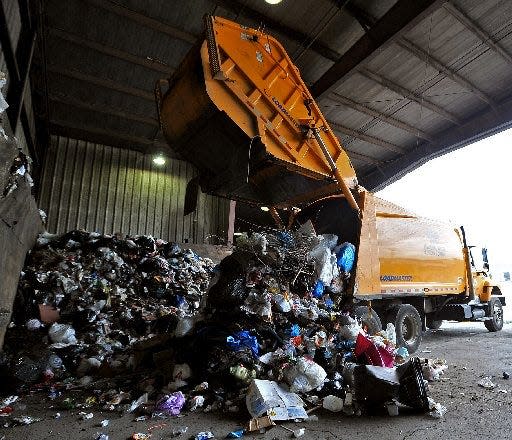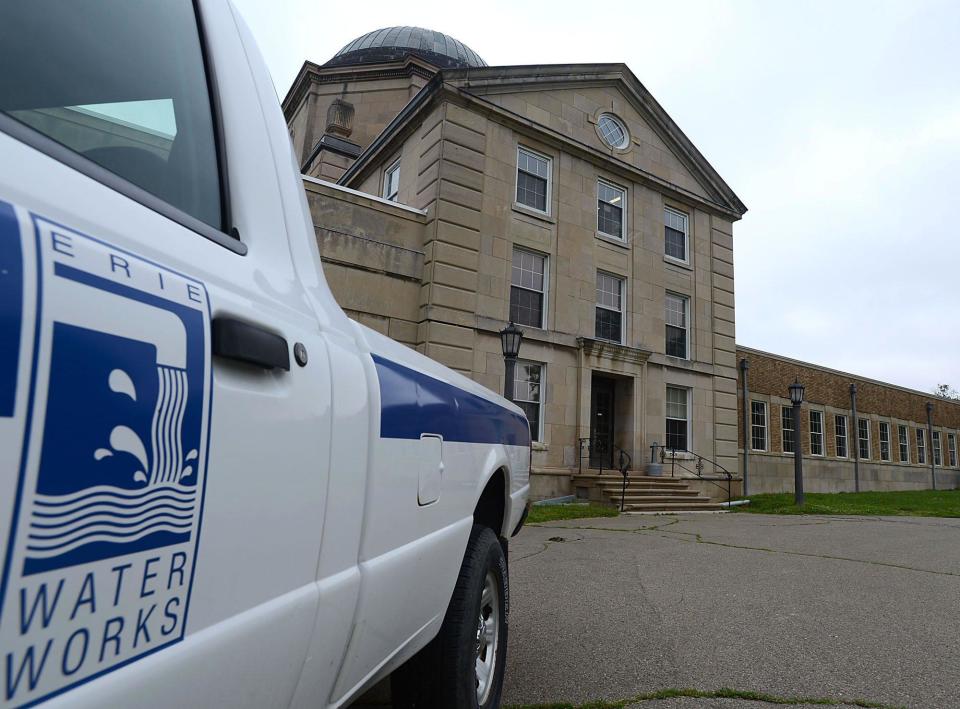Erie City Council delays passage of 2023 budget, directs Schember to cut $2 million
- Oops!Something went wrong.Please try again later.
Erie Mayor Joe Schember received a directive from Erie City Council on Wednesday night: find a way to slash at least $2 million from his $98.2 million general fund budget proposal for 2023.
City Council voted 4-3 to approve a resolution, sponsored by Councilman Ed Brzezinski, that directs Schember to make substantial cuts to his spending plan. Council then voted to postpone a final vote on the budget proposal; the seven-member panel is now expected to vote on the budget when it reconvenes Tuesday at 5:30 p.m.
Schember presented his budget proposal to City Council on Oct. 19. The spending plan did not include a property tax increase, but it plugged in garbage and sewer fee hikes expected to collectively generate about $1.8 million for the city.
More: New stormwater fee approved as City Council gets 2023 budget plan, with trash/sewer fee hikes
The proposal also includes a new citywide stormwater fee for property owners, and suggests using $3.3 million in funds set aside from the Erie Water Works lease prepayment deal of 2020, which provided the city nearly $97 million to stabilize its finances.
Brzezinski, however, said he wants Schember to find a way to present a balanced budget without using those reserve funds, which is why his resolution calls for Schember's administration to find a way to make additional cuts.
"There’s money in that budget that can be moved around," Brzezinski said.
Council members Michael Keys, Jasmine Flores and Mel Witherspoon supported Brzezinski's resolution. Council President Liz Allen, along with Chuck Nelson and Maurice Troop, opposed it.

Allen warned her colleagues who voted for Brzezinski's resolution that Schember's administration might now have to make deep cuts to city services to find an additional $2 million to remove from the spending plan.
"You guys own it," said Allen, who called the move to call for additional cuts shortly before a final budget vote "ridiculous."
Schember, who attended the meeting, said he was disappointed in council's vote and the budget passage delay. He said his team will begin to talk immediately about where changes could be made in revenues and expenditures.
However, Schember has repeatedly told council that there is little discretionary money in a budget that must earmark roughly 90% of its expenditures — or more than $88 million — to employee salaries and wages and benefits such as health care and pensions, and most of those costs are mandated by binding union contracts.
"I'm just telling you, I have no idea how to come up with $2 million out of this budget. I've said that many times," Schember told council members without proposing specific cuts. "You guys have to figure that out if you want to do it."
City Council has the final say on budget matters and the power to increase or decrease funding proposals. Under state law, the city must pass a budget by Dec. 31.
City Solicitor Ed Betza pointed that out to council members Wednesday night.
"I'm more worried that we have to have a budget that gets approved by the end of the year," Betza said. "You have the mayor indicating that he does not know where those cuts would come (from).
"My worry is if you're presented with a budget that does not reflect $2 million in cuts, and then we could be at a point where we're at a stalemate," Betza said. "But that will be for the drama of the next meeting."
Here are some details about the 2023 budget Schember has proposed.
Garbage, sewer fees to increase
City of Erie residents can expect to pay more for garbage and sewer service in 2023.
City Council on Dec. 7 voted 6-1 to approve refuse and sewer rate hikes that will generate about $1.8 million in revenue for the city.

The sewer rate increase is the city’s first since 2019. Garbage rates were last increased in 2020.
Fee increases:Erie City Council approves garbage, sewer fee hikes, key proposal in 2023 budget
The proposed sewer rate increase represents roughly $1.4 million in revenue and would increase the average city residential customer's sewer rates from roughly $306 a year to $343, or by roughly 12%, according to Lisa Gomersall, the city’s acting finance director.
The proposed garbage rate increase, Gomersall has said, represents roughly $412,000 in revenue and would increase an average residential customer's yearly fees by 4.3%, to $273 from $261.
During budget deliberations in late 2020 and late 2021, a City Council majority and Schember’s administration agreed to remove proposed garbage and sewer rate increases from the city's 2021 and 2022 budgets.
However, City Council approved the increases on Dec. 7 largely because several members of the panel said regular increases cannot be delayed any longer.
Brzezinski was the lone "no" vote on the increases, saying he wanted to look for additional cuts to Schember's budget proposal before passing garbage/sewer hikes.

Schember has said he hopes that in the future City Council will support raising garbage/sewer fees incrementally, by 2% to 4% each year, to avoid yearly debate over larger fee hikes.
New stormwater fee coming
Schember presented his budget proposal shortly before council unanimously signed off on another revenue-generating move Schember has pushed hard for over the past 18 months, a citywide stormwater fee.

The stormwater fee, which takes effect in 2023, will provide as much as $1.7 million each year to help make repairs and improvements to the city’s aging storm sewer system and be assessed on city properties regardless of taxable status.
Single-family homes in the city will pay a stormwater fee between $12 and $36 per year, depending on their actual square footage.
Uncharted waters: Erie property owners, officials debate proposed new stormwater fee
However, owners of larger properties inside city limits would pay more in a yearly fee based on square footage and how much of their properties are covered by impervious surfaces such as parking lots, streets, walkways and patios that allow little or no stormwater infiltration into the ground.
Property owners can also earn a fee credit of up to 45% for installing retention ponds, underground filtration systems, rain gardens or taking other measures to handle stormwater and reduce runoff.
Schember has said the fee — a priority for his administration — will help cover the multimillion-dollar costs related to ongoing stormwater system maintenance and improvements and help the city meet state and federal environmental requirements for stormwater systems.
More: Erie's stormwater infrastructure needs at breaking point? Line bursts cost $575K, put issue in focus
Schember's push for a stormwater fee was accelerated after a massive storm sewer failure on East Fifth Street in July 2021, which was first reported by the Erie Times-News, cost the city more than $1.2 million to repair and damaged both a lumber business and a rental home.
More: East Erie storm sewer failure will cost city at least $1.2 million
The Times-News reported in September 2021 that there are more than $10 million worth of storm sewer projects citywide that need to be addressed immediately to avoid the kind of massive failure the city saw on East Fifth Street.
Report: It will cost $10.5M to fix the crumbling sewer systems in these Erie neighborhoods
City Council previously endorsed using about $10.5 million of its $76 million allocation of ARP funds for various stormwater repairs.
Budget changes looming?
City Council and Schember's administration have discussed several minor changes to the spending plan at recent budget sessions.
Council will likely add about $16,000 in expenditures to the budget for the offices of the city clerk, controller and treasurer. That money will cover additional overtime, office supplies and professional services.
In addition, City Council is likely to offset that with $194,000 in additional revenues not included in Schember's original budget proposal, including salary-related reimbursements from Culture, Arts Festivals and Events of Erie, or C.A.F.E., which is the nonprofit established as a fundraising vehicle for CelebrateErie; and federal Community Development Block Grant funding.
Communications proposal
Schember's budget proposes the creation of a city Office of Communications, which he said will “allow us to communicate with the people of Erie much more effectively.”
A new city communications director, whose salary is proposed at $65,000 annually, would oversee this office.
The new director would oversee the city's two community liaisons, as well as the city's media strategist and Erie's Citizen Response Center, which responds to various resident complaints/concerns.
Water lease deal a factor
Schember said that the $3.3 million from the Erie Water Works lease prepayment deal is needed to balance the budget, in large part because of rising employee salaries and other expenses.
Erie Water Works has operated the city’s water system on the city’s behalf since 1992 through a long-term lease arrangement. Under the deal, which was finalized in October 2020, the Water Works gave the city the $96.7 million in exchange for not having to make annual lease payments of $3.8 million over the life of the lease.

Financial impact:City of Erie officials weigh $96.7 million water lease deal
The city's lump sum is a little more than half of the value of all payments that would be due the city through 2060 without the prepayment deal, or roughly $180 million.
Under the agreement, about $83 million in interest on the money the Water Works borrowed to make the lump sum payment is discounted, according to Water Works CEO Paul Vojtek.
As a result the city got $96.7 million.
Schember's use of the money in the 2023 budget is not a surprise. Schember has told City Council for more than two years that his administration planned to set aside about $11.5 million from the deal to handle any budget shortfalls between now and 2023.
That money, Schember has said, would help the city avoid property tax increases over that period of time while looking for ways to grow revenues and reduce expenses.
The city has used portions of that money in the past to help balance the budget.
The city used those funds to eliminate a $3.3 million budget deficit for 2020 and avoid a property tax increase. And in December 2021, City Council decided to set aside $1.4 million in water deal funds to balance the 2022 budget.
Nearly $79 million of the water deal proceeds has been earmarked for paying off long-term city debt, Gomersall said, and more than $6.3 million remains in reserve.
Other budget details
The budget proposal also sets aside $39.9 million for the Erie Bureau of Police; the Erie Bureau of Fire is budgeted at $27.9 million; and the Department of Public Works, Property and Parks is budgeted at $15.4 million.

Overall, the city budgeted $48.2 million for employee salaries/wages and another $40 million related to worker benefits such as health care and pensions.
The budget proposal anticipates collecting $77.2 million in taxes, including property taxes, in 2023, as well as $2.3 million from various permits/licenses and roughly $1.4 million in parking fines.
Allen said she and other council members are worried about future city budget deficits, which could exceed $10 million according to some city forecasts.
Further, Allen said that City Council must work with Schember’s administration to follow up on several recommendations made by Public Financial Management Inc., the Philadelphia-based consulting firm that in 2019 helped the city develop a long-range plan to stabilize its finances as part of the state’s Early Intervention Program for financially struggling cities.
Those recommendations include, but are not limited to, examining the long-term financial viability of Erie’s city-owned golf courses; moving away from pension plans for non-union city employees; seeking additional payment in lieu of taxes agreements with local nonprofits; moving to an automated city payroll system; and implementing more efficient recycling systems citywide to reduce tipping fees, or the fees the city pays to landfills to dispose of waste.
Contact Kevin Flowers at kflowers@timesnews.com. Follow him on Twitter at @ETNflowers.
This article originally appeared on Erie Times-News: City of Erie 2023 budget: City Council wants additional $2M in cuts

